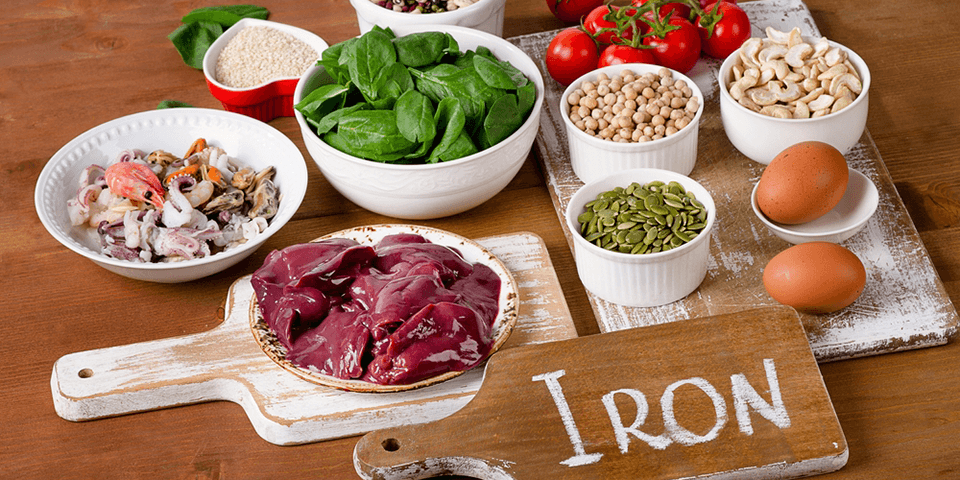Iron and folate are essential to support optimal health, being crucial in red blood cell function and playing an important role in periods of growth and development, such as pregnancy.
Iron: the mighty mineral
Iron’s importance in red blood cell function includes its role in oxygen transportation in the blood and storage of oxygen in the muscle cells. Iron is a key component of enzymes found throughout the body and contributes to proper immune function.1
For men aged 19 to 50 years, the daily recommended intake is 8mg a day, but for women, it’s 18mg a day. This increases to 27mg a day during pregnancy, when the baby’s iron stores also build up. For breastfed babies, 0-6 months, 0.2mg is recommended. For babies who are formula-fed, iron is absorbed less, and therefore formula (in Australia) is iron-fortified to ensure babies gain the recommended daily intake.1
Iron is found in food sources and comes in two types: haem and non-haem. Haem iron is easily absorbed by the body, but for non-haem iron, this is more difficult to achieve. Non-haem iron is found in plant-based foods. Those following a plant-based diet need to consume up to 80 per cent more iron than those with meat in their diets, to reach the recommended daily intake.2
Haem iron sources include meat, poultry, seafood, and organ meats. Non-haem iron sources include nuts and seeds, dried fruit, wholemeal pasta and bread, legumes, dark leafy green vegetables, and tofu.2
Iron deficiency
Developing when not enough iron is being consumed, iron deficiency often causes tiredness and headaches, and makes concentration difficult. It can also cause anaemia.
If a patient is worried about iron deficiency, they should speak with a doctor, who can prescribe iron supplements. These are also available OTC in tablet and liquid forms, but it’s important that iron deficiency isn’t self-diagnosed, as too much iron within the body can interfere with its absorption of other vitamins and minerals, and in some cases can be toxic to the body.2
Folate: the B vitamin for growth and development
The body needs folate, the natural form of vitamin B9, to grow and develop. In food, folate occurs naturally. When in supplement form, it’s known as folic acid.
Folate is important to everyone, but especially pregnant women, because a lack of folate can cause abnormalities in the development of the brain and spinal cord in babies.
Folate is also important for making DNA, forming red blood cells, and growing and repairing cells and tissues.
Unless one is pregnant, folate can be obtained through diet. It’s added to many foods, such as cereals, bread, juices, and Vegemite. In Australia, flour manufacturers are required to add folic acid to wheat flour used in bread.3
Folate is also found in green vegetables, legumes, rice, avocado and fruit.
Folate deficiency is rare in Australia, but some people don’t get enough. Supplements are available OTC and through prescription.4 However, the dosage differs depending on the person, so talking to a GP about folate deficiency is recommended to ensure the correct dose is being administered.
Folate for a healthy pregnancy
Folate is essential in the growth and development of the baby during pregnancy. It’s recommended that a folic acid supplement be taken one month before conception and for the first three months of pregnancy.5
Pregnant women are advised to look for supplements containing at least 400mcg of folic acid, and the American College of Obstetricians and Gynaecologists recommends that all pregnant women should get at least 600mcg of folic acid daily. Although pregnancy multivitamins contain folic acid, it’s important for optimal effectiveness that they contain a high enough dose of folic acid.4
References:
- Better Health Channel. ‘Iron and Iron Deficiency’. 2022. vic.gov.au/health/conditionsandtreatments/iron#what-is-iron.
- ‘Foods high in iron’. 2023. healthdirect.gov.au/foods-high-in-iron#contain.
- NSW government. ‘Folate’. 2021. com.au/wp-content/uploads/2021/02/Good-Bite-No69-at-home_webOpt.pdf .
- Australian government. Pregnancybirth&baby. ‘Folate and pregnancy’. 2021.org.au/folate-and-pregnancy.
- Government of Western Australia. ‘Folate and pregnancy’. 2022. wa.gov.au/Articles/F_I/Folate-and-pregnancy.
This feature was originally published in the September issue of RP magazine.




